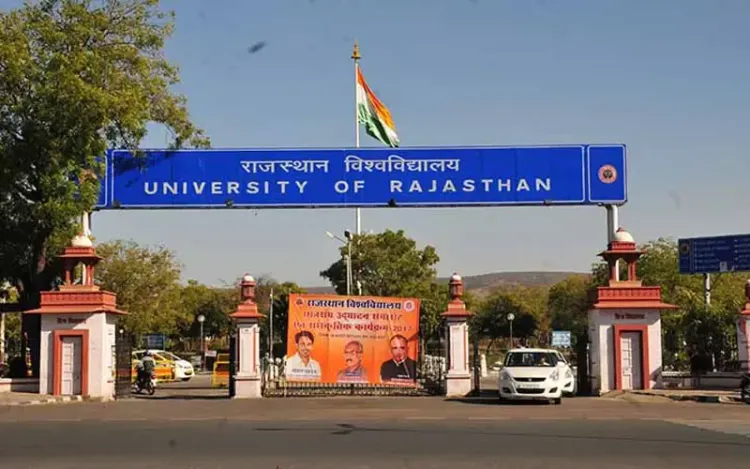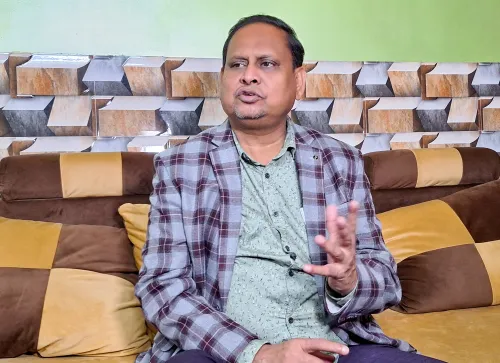Heads of Rajasthan Universities to be Designated as ‘Kulguru’

Synopsis
Key Takeaways
- Rajasthan Universities Laws (Amendment) Bill introduces ‘Kulguru’ title.
- Key policies for textile, data center, and logistics sectors approved.
- Rajasthan aims to become a global textile hub.
- New youth policy to empower younger generations.
- Consolidation of tax boards for efficiency.
Jaipur, Feb 4 (NationPress) The Rajasthan government is set to unveil the Rajasthan Universities Laws (Amendment) Bill, officially granting the title of ‘Kulguru’ to university heads (Vice Chancellors).
This decision emerged during a cabinet meeting at the Chief Minister’s Office on Tuesday, led by Chief Minister Bhajan Lal Sharma. The gathering also resulted in crucial policy approvals aimed at enhancing the state's industrial and economic growth, including the Rajasthan Textile and Apparel Policy, Rajasthan Data Center Policy, and Rajasthan Logistics Policy.
Moreover, the Rajasthan Youth Policy was sanctioned to empower youth, alongside discussions on amendments to land revenue laws and service regulations.
Post-meeting, Parliamentary Affairs Minister Jogaram Patel and PHED Minister Kanhaiya Lal affirmed the Rajasthan government's ambition to transform the state into a global hub for textiles and apparel manufacturing.
The Rajasthan Textile and Apparel Policy-2025 has been introduced with the aim of establishing the state as a global manufacturing epicenter. This policy emphasizes sustainable growth in the textile sector, job creation, skill development, innovation, productivity enhancement, and boosting exports and international competitiveness.
The policy is projected to draw in ₹40,000 crore in investments and create thousands of new job opportunities in the state, as noted by Patel.
In response to the increasing demand for information technology and data security, the Rajasthan Data Center Policy-2025 has been approved to stimulate private sector investment in data centers.
To foster industrial growth and enhance connectivity, the Rajasthan Logistics Policy-2025 has also been greenlighted. The incentives under this policy include capital and interest subsidies, tax concessions for warehouses, cold storage, cargo terminals, logistics parks, and land reservations.
The Cabinet also ratified the Rajasthan Youth Policy-2025, which replaces the 2013 version. This new policy seeks to ensure youth access to quality education, skills, healthcare, employment, and entrepreneurship, promote youth engagement in social, economic, political, and cultural areas, and support emerging talents in arts, sports, literature, and culture, according to Kanhaiya Lal.
Since the implementation of GST in 2017, the role of the Rajasthan Tax Board has diminished. The Cabinet has now consolidated it with the Rajasthan Revenue Board to enhance efficiency in managing revenue and tax-related appeals.
The Parliamentary Affairs Minister mentioned that the Rajasthan Land Revenue (Amendment Validation) Bill-2025 will be introduced to address land conversion and other issues concerning industrial areas transferred to RIICO. The Cabinet approved the draft of this bill, proposing to delegate rule-making powers to the state government by amending Section 281 (2) of the Rajasthan Land Revenue Act 1956.
RIICO will be empowered to oversee land use changes, subdivisions, lease deed executions, and leasehold rights transfers conducted in the industrial areas, along with the ability to notify separate rules for future operations.
He indicated that once this bill is enacted, it will aid in resolving challenges faced by entrepreneurs in industrial zones allocated to RIICO by the Industries Department.
Patel revealed that MoUs worth ₹35 lakh crore have been signed during the Rising Rajasthan Global Investment Summit.
Among these, the highest MoUs, exceeding ₹28 lakh crore, have been in the energy sector, propelling the state towards energy surplus status.
In this context, land allocations for solar projects are underway, with 292.53 hectares in villages Basda, Magra, Kotha, and Devda of Fatehgarh tehsil in Jaisalmer district designated for a 200 MW solar project, 672.59 hectares in villages Kotha and Harbha for a 358.83 MW solar project, 162 hectares in revenue village Nagarda and village Kalijal in Shiv tehsil of Barmer district for a 300 MW solar project, and 119.4 hectares in village Nokh of Bap tehsil in Phalodi district for a 59.9 MW capacity.
Additionally, approximately 74.97 hectares in village Kailashnagar-1 and village Bhaglikheda of Shivaganj tehsil in Sirohi district will be allocated for the construction of a 765 kV electrical substation under Section 102 of the Rajasthan Land Revenue Act-1956.










